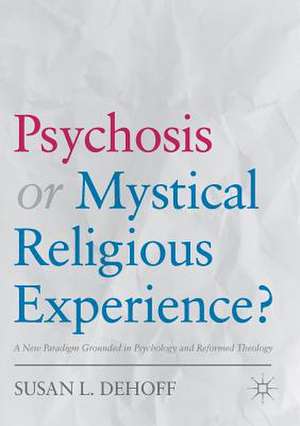Psychosis or Mystical Religious Experience?: A New Paradigm Grounded in Psychology and Reformed Theology
Autor Susan L. DeHoffen Limba Engleză Paperback – 11 mai 2019
| Toate formatele și edițiile | Preț | Express |
|---|---|---|
| Paperback (1) | 417.30 lei 6-8 săpt. | |
| Springer International Publishing – 11 mai 2019 | 417.30 lei 6-8 săpt. | |
| Hardback (1) | 501.24 lei 6-8 săpt. | |
| Springer International Publishing – 22 feb 2018 | 501.24 lei 6-8 săpt. |
Preț: 417.30 lei
Nou
Puncte Express: 626
Preț estimativ în valută:
79.85€ • 83.38$ • 65.94£
79.85€ • 83.38$ • 65.94£
Carte tipărită la comandă
Livrare economică 15-29 aprilie
Preluare comenzi: 021 569.72.76
Specificații
ISBN-13: 9783319885735
ISBN-10: 3319885731
Pagini: 248
Ilustrații: XVII, 248 p. 3 illus.
Dimensiuni: 148 x 210 mm
Greutate: 0.32 kg
Ediția:Softcover reprint of the original 1st ed. 2018
Editura: Springer International Publishing
Colecția Palgrave Macmillan
Locul publicării:Cham, Switzerland
ISBN-10: 3319885731
Pagini: 248
Ilustrații: XVII, 248 p. 3 illus.
Dimensiuni: 148 x 210 mm
Greutate: 0.32 kg
Ediția:Softcover reprint of the original 1st ed. 2018
Editura: Springer International Publishing
Colecția Palgrave Macmillan
Locul publicării:Cham, Switzerland
Cuprins
1.Mystical Religious Experience and Psychosis: Contours of the Problem .- 2.Reformed Theology: Historical Perspectives on Mystical Experience .- 3. Psychoanalytic Views of Mystical Religious Experience.- 4. Post-Freudian Psychological Theories.- 5. Research: Presbyterian Church (USA) Views on MRE.- 6. Theology and Psychology: An Interdisciplinary Discussion.- 7. Proposing A New Paradigm.- 8. Conclusion
Recenzii
“Susan DeHoff has written a significant book on an important topic. It will be of interest to all scholars concerned with the intersection of psychology and theology, especially those interested in the psychology of religion. … DeHoff has nevertheless made a valuable contribution to this important topic that deserves a hearing.” (Stephen E. Parker, The International Journal for the Psychology of Religion, March, 2019)
“This is an important book for all those who have been seduced into accepting the claim that often re-appears in the history of mysticism, namely that there are no Protestant mystics. … The clarity of her focus and her in-depth useof empirical data make this book an important contribution to the continuing interest in mysticism both within and outside of religious traditions.” (Scriptable, rtreview.org, Issue 32, September, 2018)
“The conceptual and historical reach of this book is extensive … DeHoff's book is a solid step in the direction of the needed collaboration between the disciplines of clinical psychology, theology, and pastoral care. … Summing Up: Recommended. Upper-division undergraduates through faculty and professionals.” (M. Uebel, Choice, Vol. 56 (2), 2018)
“The conceptual and historical reach of this book is extensive … DeHoff's book is a solid step in the direction of the needed collaboration between the disciplines of clinical psychology, theology, and pastoral care. … Summing Up: Recommended. Upper-division undergraduates through faculty and professionals.” (M. Uebel, Choice, Vol. 56 (2), 2018)
Notă biografică
Susan L. DeHoff is Visiting Scholar in the School of Theology at Boston University, USA. She holds a PhD in Counseling Psychology and Religion from Boston University, USA and a M.Div. from Emory University, USA. DeHoff is ordained in the Presbyterian Church (USA) and is a Fellow of the American Association of Pastoral Counselors.
Textul de pe ultima copertă
This book presents a new paradigm for distinguishing psychotic and mystical religious experiences. In order to explore how Presbyterian pastors differentiate such events, Susan L. DeHoff draws from Reformed theology, psychological theory, and robust qualitative research. Following a conversation among multidisciplinary voices, she presents a new paradigm considering the similarities, differences, and possible overlap of psychotic and mystical religious experiences.
Caracteristici
Includes cutting-edge original research undertaken by the author into pastoral conceptions of mystical religious experience and how it differs from psychosis Provides comparative analysis of current theological beliefs and practices and psychological theories and practices around psychosis and mystical religious experience Outlines provisional guidelines for clinical and counselling professionals that distinguish mystical religious experience in relation to psychosis
